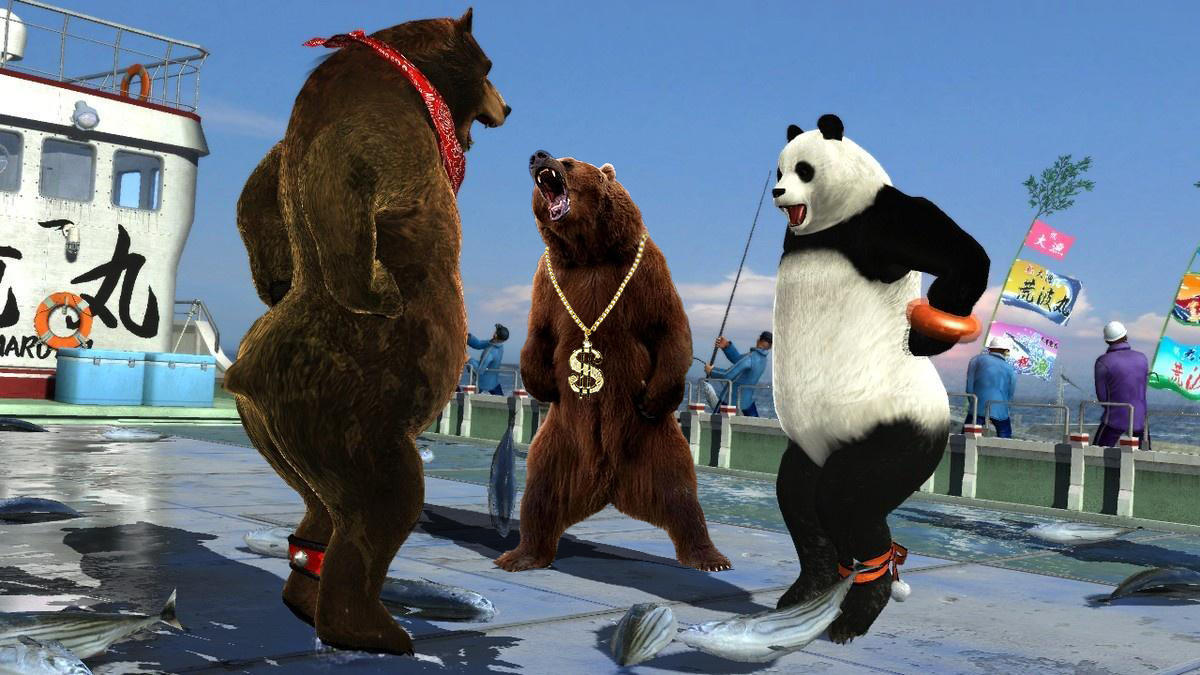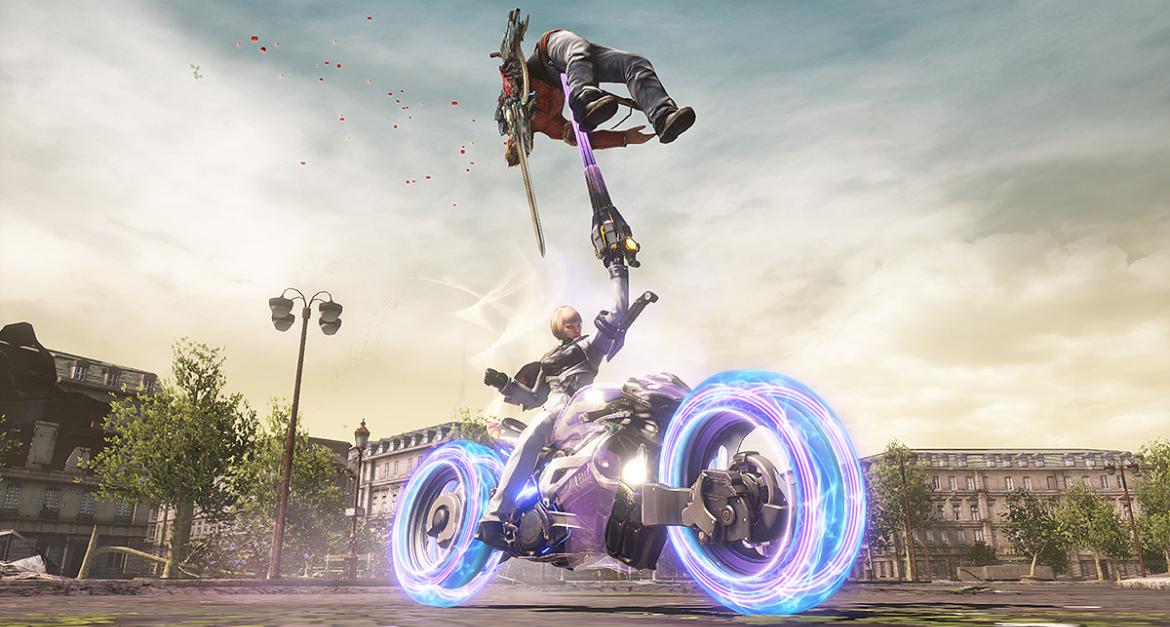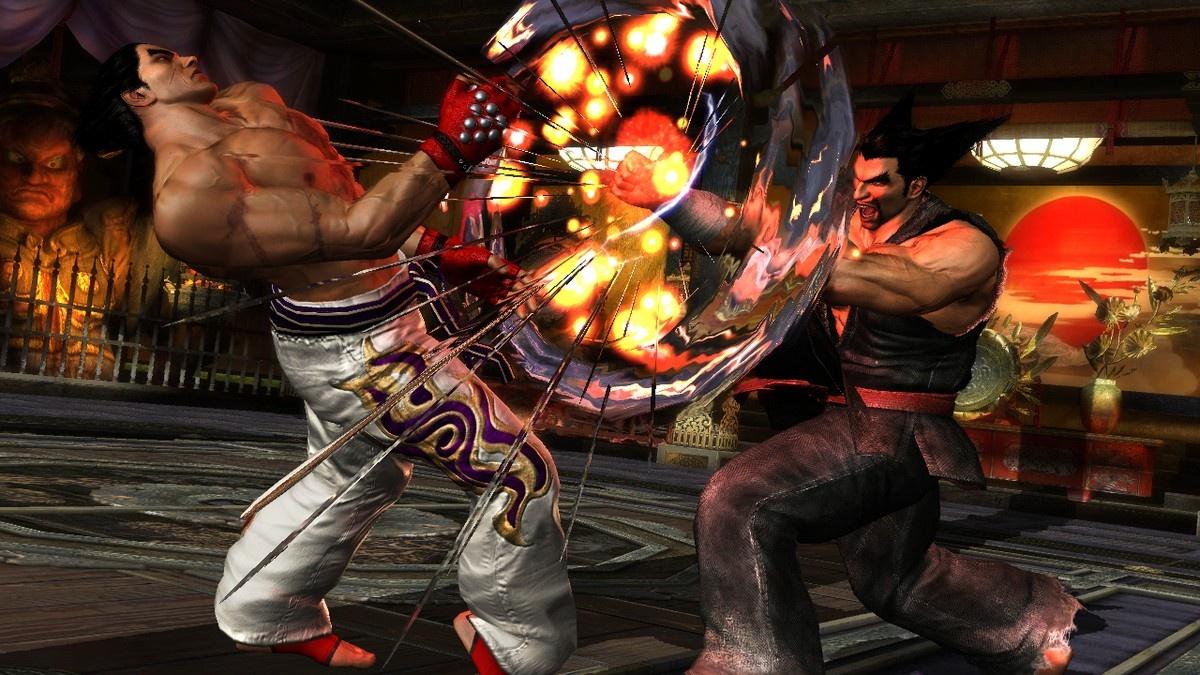Tekken It to the Limit With Katsuhiro Harada
Get ready for the next battle.
I'm sitting at a cramped little table at the Las Vegas Resort & Casino surrounded by Bandai Namco's Katsuhiro Harada, Daisuke Murano, and Michael Murray. We're smack-dab in the middle of the casino floor discussing fighting game development. Across from us, several rows of slot machines come alive with bright lights and electronic jingles for their patrons. Money goes in, but never comes back out. This isn't surprising. One machine continuously plays a sweet eagle screech.
Katsuhiro Harada is the director of the Tekken franchise, while Daisuke Murano and Michael Murray are both producers on Bandai Namco's upcoming Rise of Incarnates, which I saw back at the 2014 Electronic Entertainment Expo. Some of you may recognize Murray's name, because he is also Harada's longtime translator for the Western press--or at least he has been for as far back as I can recall. Over beers, the four of us talked fighting games, Eastern versus Western business practices, and Twitch streaming. Unfortunately, this interview took place before the big Tekken 7 announcement, so I don't have any juicy tidbits about that game for you just yet.

How has developing a fighting game changed since you started working at what is now Bandai Namco?
Katsuhiro Harada: The costs involved have grown exponentially. Look at the Japanese animation industry: a long time ago, we used to create by hand all the key animation cels. But recently it has become too expensive to do that, so everyone ships out their work to China or elsewhere. The same can be said for games. It's expensive to use Japanese developers, so we're increasingly relying on outsourcing to make all the assets and such for our games just to make ends meet. That's something that's definitely different from a long time ago.
Daisuke Murano: From the beginning of Rise of Incarnates' development, our team has been very international--just look at Michael and me. In fact, our team is so international, a lot of times we'll have our meetings exclusively in English.
Michael Murray: Yeah, [Daisuke] is a producer and I'm a producer, so we do it all in English. We work with our outsourcing company, the US offices, and others all in English. It's a really unique team. Even our main art lead speaks English.
DM: Rise of Incarnates' director lived in the US for 10 years, and the story writer lived in the US for seven years. Now they live in Japan, but sometimes we'll have conversations in English, and suggest American comics or Marvel or DC comics, or even American cities, as points of inspiration for the game.
Was putting together this sort of international team by chance, or was it planned that way from the beginning?
MM: It was by chance. I knew Daisuke while working on Frame City Killer, and we became pretty close, so I would go visit him all the time and see what he was working on. One day he showed me [Rise of Incarnates] and said it would be cool if I could join the team. Tekken was wrapping up at the time, so I chose to join, and we made that happen. But that was on our level. As far as management goes, they didn't really have any designs like that.
DM: With Rise of Incarnates, our main user is worldwide, so we thought about it and decided we needed to make an international team with an international frame of mind.

If you're working internationally, do the Eastern and Western styles of business clash?
MM: That's actually my job! [Bandai Namco] is a Japanese company, and their way of doing things is different. They don't see the importance of community, for instance, and a lot of things that Harada is doing now [for Tekken] is by his own power. He's able to just do it without anyone complaining. He doesn't really ask management, and if they complain, he'll deal with it, but traditionally it doesn't work like that. Daisuke and I talk about what we want to do, and then it's my job to present those ideas to management. And I have to frame it correctly, because I know how [management] thinks, but I also know this is important for the American audience. I've done a lot of [that sort of work] on Tekken as well. We're the first to do this in the company for a lot of the stuff we do. I push it through management, and it's an uphill battle, but I've been there so long that I'm able to convince them. Having been there 10 years now, I've built up a little stock. That's why we're trying a lot of new things, and it can be difficult to push through.
Since so much of Bandai Namco is centered around fighting games now, it's surprising to hear that community support isn't viewed with more urgency from up top.
"A lot of things that Harada is doing now [for Tekken] is by his own power. He doesn't really ask management, and if they complain, he'll deal with it, but traditionally it doesn't work like that."
MM: They say, "Well, if we do this, how much profit does it make?" and that's hard to equate. Harada and I are the only ones who go to these events abroad and see firsthand the impact it has, and that's not something you can measure on paper. Harada just takes responsibility and does it, and a lot of times he gets yelled at.
KH: A lot of people just don't know what this is like.
MM: Western developers all have a Twitter account and just tweet whatever they want. In Japan, you have to apply for an account in the company, and there are all these restrictions. Harada had one before there were all those restrictions, and I had one as well, so we just do what we want, and it has been successful so far, but a lot of times people are just copy-pasting press releases and such. That's something I've been able to help Daisuke with because I can go to our boss and say, "Let us do this and I'll take responsibility." But I'm still not the maker of Tekken, so I can't do anything I choose, but I do get away with a lot more than most people, and I try to make that benefit Rise of Incarnates. Daisuke is learning the ropes though--he gets to come out with Harada to events like this after all.
So what is the average age of the Tekken team?
KH: Probably late 30s is the average. From 35 and above is when you maybe start to be a producer. It takes some time to get those responsibilities.

I find most fighting games are still designed with the one-on-one, arcade-style mentality in mind. Do you ever see yourself moving away from the arcade scene?
KH: You gain a lot from the arcade. [Patrons] will try your game at least once, but if it sucks, they'll never play again, so it's a severe environment to be in, but that just makes you stronger. And since it's a public place, you can see how people are enjoying your game: are they pissed off or unhappy or just half-assing it and complaining? With high-speed Internet, it might be easier to balance the game because you get all this data, but you can't get that emotional feedback--unless you had a camera or something attached to the console to measure facial expression or heart rate. Using the streaming feature on the PS4 to watch how users are playing could give you a similar experience to being in the arcade, but [watching players] is still a really important aspect of development that could be lost if we didn't have an arcade presence.
KH (cont.): You look at Super Nintendo games or Genesis games or even mobile games, and a lot of those companies rely on KPI data and statistics alone to balance their games and get the most profit. For the most part, that is a company's focus--profit--but also those games are so simple that you're able to tell quite a bit from numbers alone. However, for something as complex as a fighting game, that's something you can't read though numbers alone. That's why we place an importance on showing up to tournaments and arcades and monitoring players' experiences with our game.
"With high-speed Internet, it might be easier to balance the game because you get all this data, but you can't get that emotional feedback...[watching players] is still a really important aspect of development that could be lost if we didn't have an arcade presence."
DM: Rise of Incarnates is interesting because the length of each match is similar to an arcade [fighting game] experience, but there are elements from other genres as well. It's not purely a fighting game, per se. The overall gameplay benefits from communication with your partner. It's not just about logging in, playing for a few minutes, and logging out. It's about strategizing and discussing the matchups with your partner and implementing that theory, as well as the customization aspect as well. There is that human element at work that needs to be recognized.
How would a fighting game that is not designed with the arcade mentality in mind function? For example, Harada-san, what if you designed Tekken without letting players share the same screen?
KH: We've discussed that before, actually. There are some cool things you could do: you could make the dramatic effects and [impact] effects even more over the top since it's not a shared screen. You could put the move list on the screen for your fighter, or other personalized stuff. There are lots of cool things you could do with screen personalization, but there are also benefits you get from being part of a community or being in an arcade where you're seeing your opponent directly. In Japan, you see top players and they have these beautiful girls alongside them, and other players see them and think, "Oh man, I want that!" And that is something you'd miss, though you could maybe show that online too.
Perhaps using some sort of streaming service, like Twitch? How prevalent is Twitch, or online streaming in general, in Japan?
KH: Twitch is starting to pick up a bit, but the main one is still NicoNico. People are playing on that, but for very fast-paced stuff, it's hard to show it correctly on NicoNico, so people are kind of noticing that Twitch is better suited for that. Even so, it's not whether you're good at the game or a top player or whatever. In Japan, it's all about that person's personality. They need to be commentating and be interesting to listen to. We have a term that roughly translates as "stream master," and they're actually quite famous and make a lot of money doing that. It's kind of a different format than what is in the US, I think.
Yeah, in America I think we're much more willing to simply watch a good player, even without commentary.
MM: I was thinking of doing some Twitch streaming with Daisuke, actually. Harada and I could jab at him while he's playing! But I'm kind of serious, because Rise of Incarnates is a new title, and if we could stream it from our office and just be shooting the shit, it would be fun for us at the same time, and people would be able to see something they can't play yet.

That sort of transparency in development is something that's becoming more and more important here in the US. What about in Japan?
MM: That's going to be my biggest hurdle yet. No one is doing that in Japan. This is just an idea that I came up with that I pitched to Daisuke, and he wants to do it, so the next step is convincing our boss to say OK, which might be the most difficult thing I've ever done, but I think it would be a good opportunity for this title. It's rough because we make a Facebook page or something for Tekken, and it gets three million likes instantly, and then we make one for Rise, and we get maybe three thousand to start. But yeah, [transparent development] isn't really prevalent in Japanese society, and convincing the companies that this is something we should do is still pretty difficult. If I succeed, it'll probably be the first time a Japanese company has done it. And when the next Tekken comes around, Harada will just do what he wants.
So there are going to be a bunch of live streams with Harada in his pajamas drawing up design documents?
MM: Yeah, and he'll be drinking tequila the whole time.
Got a news tip or want to contact us directly? Email news@gamespot.com
Join the conversation